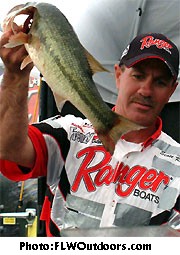Tournament Fishing - Free Flow of Information Not Allowed!
Tournament Fishing - Free Flow of Information Not Allowed!
By Ken Warren
Our country is based on two principles that seem to have collided in the fishing industry casting serious doubt as to the validity of information flowing out of the industry. These are the free-market system and free speech. One of the most blatant examples of this is some of the infamous “duct tape” pictures from the FLW Tour. It appears that FLW Outdoors believes that allowing a pro to show a logo patch of a sponsor that is not also an FLW sponsor is a threat to their business. Interviews are run much the same way. The pro must either not mention what they used if it is not the tour sponsor’s product or they must refer to it generically by simply stating “a spinnerbait.” I am aware of at least one instant where a pro outright lied about what they used and he was caught once someone examined the pictures. I’m sure this isn’t the norm, but I am sure the pressure is there to do so. The reason for these restrictions is clearly to protect the series sponsors and their advertising dollars.
 It is probably safe to say this increases the circuit’s ability to gain sponsors because they are, in effect, given an exclusive. If this statement is true it then follows that this practice will hurt the individual angler’s ability to get sponsorship dollars. This all occurs while the organization claims they are there for the angler. While this was once fairly easy to believe, now it is becoming clear they are there for the profit.
It is probably safe to say this increases the circuit’s ability to gain sponsors because they are, in effect, given an exclusive. If this statement is true it then follows that this practice will hurt the individual angler’s ability to get sponsorship dollars. This all occurs while the organization claims they are there for the angler. While this was once fairly easy to believe, now it is becoming clear they are there for the profit. Another example I’ve become aware of occurred after a winning angler, who requested to remain anonymous, was interviewed. The open question was asked, “How did you catch the winning sack.” He began by stating he was pitching a lure and stated the brand. The interviewer gave him a stern look but let him go on. Into the discussion he mentioned the lure brand again and the interviewer blocked the audio for a few seconds and told him if he mentioned it again they would end the interview because they were not a series sponsor. A final example which occurs everyday on the various forums and web pages that many of us frequent at the grass roots level concerns what can be said and what cannot. The situation will occur something like this: an angler asks an innocent question concerning who make the best jig or something to that effect. Then two types of posts come out of it. One will state John Smith makes the best here is where to get them. The second will respond in detail why he likes a certain brand and then he may or may not state where they can be acquired depending on how obvious it is. It is sad, but because of the abusive nature of the first type of post which is not much better than spam, the second type is not allowed either. The result is both responses are deleted by the moderator and the original guy asking the question either doesn’t get an answer or it is at best watered down as only board sponsors posts are kept and the rest removed. With all of this now mentioned, I don’t necessarily disagree with all of these practices. Every business has the right to screen what is allowed to flow from them. This would apply to the forums especially and also to the televised tournaments. That is the market system we live in. I think the problem occurs when there is no disclaimer stating the practice is occurring. Now the viewer assumes he is getting the whole story and a straight answer but this is not true in many cases. This article is intended to stir some controversy and shine a light on what could be considered bad practice from the fishing industry as a whole. At the same time it is intended to make the consumer aware they should view the various mediums with some skepticism. I have not stopped viewing or reading fishing programs, in fact, I am now reading more. I do, however, always ask myself what is not being said and try to read between the lines. For instance, you may read an article discussing how to fish a John Smith jig. This article may be very informative and be filled with good techniques but is there a reason it applies only to John Smith jigs? More than likely there is not, or possibly there is a subtle difference. So think it through and make your own call. Sponsored fishermen will go out of their way to mention sponsors during interviews and in articles. If you notice the brand was not mentioned you can bet it was not a company that sponsored that magazine, television program, or the angler. Even if it is mentioned, I often will question it because of the pressure to satisfy the sponsors. Please don’t shy away from the fishing media, but instead just be smart about your reading. It might be what isn’t said that could be the most important aspect of it. In general, the techniques are good but the brand or tackle has less to do with whether or not it is successful. Master the techniques and then experiment on you own to decide which brand fits you
|
